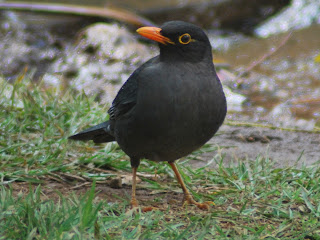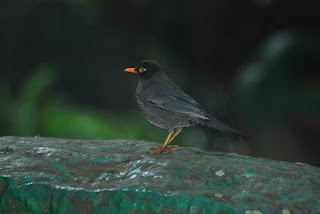You would mostly find White-naped Woodpecker in groups comprising mostly of siblings or parents, sometimes even unrelated young ones which they are known to tutor. Seen in well wooded country they are quite active and loud. I am getting quite lucky with woodpeckers and this one might be the seventh or eighth specie I am writing in this site. Since then I am able to gather one more information about Woodpecker and that is they tap the wood-a hollow sound, also to let know their territory.
Eugenio Montale: Bring me the sunflower that I may transplant it
Bring me the sunflower that I may transplant it
in my saline burned ground,
and that it might display all day to the blue expanses
of the sky the anxiety of its pale yellow face.
Things that are dark long for brightness,
the bodies exhaust themselves in a flowing
of colours: these become music. To fade away
is therefore a chance among chances.
Bring me the plant which leads
to where the blonde transparencies appear
and where life dissolves like essence;
bring me the sunflower insane with light.
 One of the website i visit atleast once in a fortnight is the Nobel Prize website. It’s about some amazing people. Awards may or may not be important and there may be many brilliant people who may not have got awards but the fact remains that Nobel Prize winners are mostly some very remarkable people, who have done some amazing stuff. In my younger days despite problems and craps one face in life one thing i kept an eye on was who were the Nobel Prize winners and what they have done and its implications, as also what they have to say. Many a times i used to keep paper cutting, now of course internet has made it easier. And yes their speeches became important reference points, as also initiating myself into refined reading.
One of the website i visit atleast once in a fortnight is the Nobel Prize website. It’s about some amazing people. Awards may or may not be important and there may be many brilliant people who may not have got awards but the fact remains that Nobel Prize winners are mostly some very remarkable people, who have done some amazing stuff. In my younger days despite problems and craps one face in life one thing i kept an eye on was who were the Nobel Prize winners and what they have done and its implications, as also what they have to say. Many a times i used to keep paper cutting, now of course internet has made it easier. And yes their speeches became important reference points, as also initiating myself into refined reading. It is while i was visiting the website the other day that i came across this Italian poet (must add Swedish poet Martinson about whom i wrote in my earlier blog was also a find from this website). Eugenio Montale (1896-1981) served as an Infantry officer during World War I, when he was asked to join the Fascist forces during late 1930s he quit public life and devoted his attention to translate Shakespeare and Eliot into Italian, in the meantime he wrote some wonderful poems. Montale once remarked, "I do not go in search of poetry. I wait for poetry to visit me."
The Lemons
Listen, the prize poets stroll
only among the trees
with uncommon names:
boxwood, privet, acanthus.
Me, I love roads that run out
among grassy ditches into
mud-puddles where kids
hunt skinny eels; lanes
that follow field-banks down
through beds of reeds and
end up in back gardens
among the lemon trees.
Best if the birds' chatter-prattle
is hushed, swallowed up
by the blue: then you'll hear
– clearer in the still air – the whisper
of companionable branches,
and catch a sense of that smell
that can't tear itself from earth,
drenching you in edgy pleasure.
Here, by some miracle, the battle
between one distracting passion
and another dies down, and here
even we who are poor
pick up our share of wealth –
and it's the scent of lemons.
Look, in these silences
which things sink into
and seem on the verge of
opening their closest secret,
you'd expect once in a while
to uncover some mistake
in nature, the world's still point,
some weak link, the loose thread
that leads us at last
to the heart of truth. Eyes
rummage in every corner:
the mind seeks agrees argues
with itself in this perfume
that floats – as day fades –
over everything; a silence
in which, in every dwindling
human shadow, a troubled
divinity could be seen.
But the image fades, and time
takes us back to the din of cities
where you see the sky only
in bits and pieces, off up
among the chimneys. Rain then
wears the earth out, dreary winter
settles down around the houses,
light grows miserly, the soul bitter,
till one day, through a half-
shut gate, you see
among the trees in someone's yard
the yellows of lemons –
and the heart's ice melts,
and with their music
the golden trumpets of sunshine
blow your bones wide open.
Do not ask us the word which in every way
Do not ask us the word which in every way
our shapeless soul perhaps measures, and in letters of fire
may declaim it and shine like a crocus
lost in the centre of a dusty field.
Ah! the man who goes away sure,
to others and to himself a friend,
and cares not about his shadow which the dog days
reflect across a plasterless wall!
Ask us not for the formula to open worlds for you,
only some syllable distorted and dry like a twig.
This alone is what we can tell you today,
that which we are not, that which we do not want.
Doubt
I was giving a lecture
to the "Friends of Cacania"
on the subject "Is Life Likely?"
when I remembered I
was totally agnostic,
love and hate in equal parts and the outcome
unsure, depending on the moment.
Then I decided five minutes
were enough--
two and a half for the thesis
two and a half for the antithesis
this was the only homage possible
for a man without qualities.
I spoke exactly thirty-five sconds.
And when I said
that yes and no were look alikes
shouts and whispers interrupted my talk
and I awoke. It was the most laconic dream
of my life, maybe the only one not devoid
of "quality."
Often I have encountered the evil of living
Often I have encountered the evil of living:
it was the strangled stream which gurgles,
it was the crumpling sound of the dried out
leaf, it was the horse weaty and exhausted.
The good I knew not, other than the miracle
revealed by divine Indifference:
it was the statue in the slumber
of the afternoon, and the cloud, and the high flying falcon.
I recall your smile, and it is for me a lucid water
I recall your smile, and it is for me a lucid water
Discovered by chance between the pebbles,
a meagre mirror in which to watch a reflection of the ivy,
and with it all I embrace a quiet white sky.
Such is my memory; I would not know how to describe,
or distant from your face as it expresses the free, innocent spirit,
Or are you a wanderer who challenges the evil of the world
and who carriers his suffering with himself like a talisman.
But this I can say to you, that the memory of your image
engulfs the animosity in a big, calm wave,
and which your image brings to my vivid memory
Openhearted like the tip of a young palm…
Winter lingers on. The sun is doled out
Winter lingers on. The sun is doled out
with a dropper. Isn't it strange that we,
lords and perhaps inventors of the universe,
to understand a piece of it, must trust
the charlatans and soothsayers mushrooming everywhere?
It seems obvious the Gods
are beginning to tire of their presumptive
children or wards.
Even clearer that, Gods or demigods,
they in turn have quit
their employers, if they ever had any.
But. . .
The Wall
To lie in shadow on the lawn
By a crumbling wall, pale and withdrawn
And spy in the weeds the gliding snake
And hear the rustle blackbirds make –
To watch in the cracked earth and the grass
Battalions of red ants at drill,
That break and form ranks, pass and repass
In busy marches on some tiny hill –
To catch, each time the leaves blow free,
The faint and pulsing motion of the sea,
While ceaseless, tremulous and shrill,
The cicadas chatter on the bald hill –
Rising, to wander in bewilderment
With the sun's dazzle, and the sorry thought
How all our life, and all its labors spent,
Are like a man upon a journey sent
Along a wall that's sheer and steep and
endless, dressed
With bits of broken bottles on its crest.
From my scribbling pad.....
Mishap with the shaving razor
Scrapped skin pinch a drop
of blood out the throbbing vein
from the dreary task of oxygen carriers
nano matters that cleave life from death
ferrous ignited RBCs glisten under the bulb.
Aeons ago,
Time, Space and Matter encounter the laws of nature
meanwhile supernovas billions of light years afar
let itself die and condense into an
arrangement that let butterfly hold its colours.
Is it a star or is it divine
that dance in my blood?










